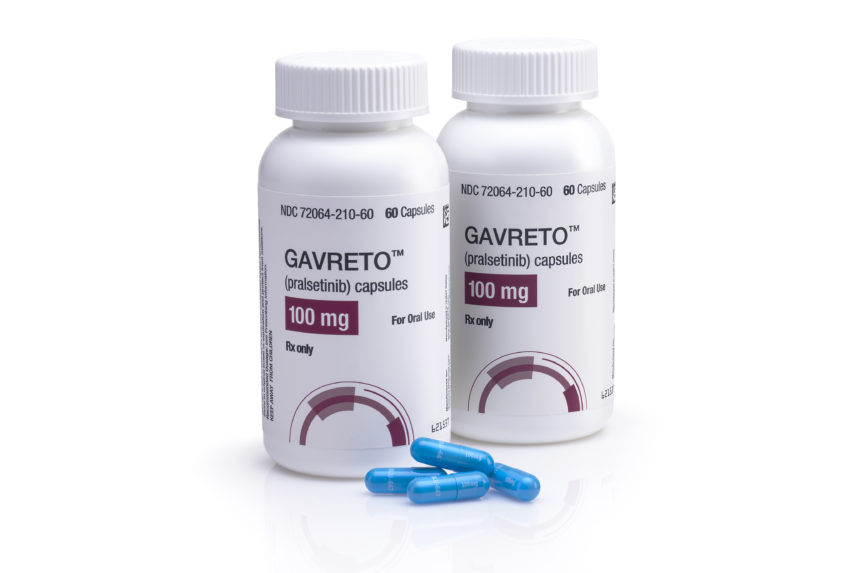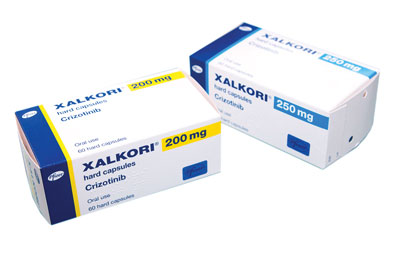Gavreto (pralsetinib) vs Xalkori (crizotinib)
Gavreto (pralsetinib) vs Xalkori (crizotinib)
Gavreto (pralsetinib) is a selective RET kinase inhibitor indicated for the treatment of adult patients with metastatic RET fusion-positive non-small cell lung cancer (NSCLC), as well as for certain types of thyroid cancers. Xalkori (crizotinib) is a multi-kinase inhibitor that targets ALK and ROS1, and is used primarily for the treatment of ALK-positive or ROS1-positive metastatic NSCLC. The choice between Gavreto and Xalkori would depend on the specific genetic alterations present in a patient's cancer, as determined by molecular testing, and should be guided by a healthcare professional who can consider the patient's overall health condition and the specific characteristics of their cancer.
Difference between Gavreto and Xalkori
| Metric | Gavreto (pralsetinib) | Xalkori (crizotinib) |
|---|---|---|
| Generic name | Pralsetinib | Crizotinib |
| Indications | Adult patients with metastatic RET fusion-positive non-small cell lung cancer (NSCLC) | Adult patients with metastatic non-small cell lung cancer (NSCLC) whose tumors are anaplastic lymphoma kinase (ALK) or ROS1-positive |
| Mechanism of action | RET kinase inhibitor | ALK and ROS1 receptor tyrosine kinase inhibitor |
| Brand names | Gavreto | Xalkori |
| Administrative route | Oral | Oral |
| Side effects | Constipation, hypertension, fatigue, musculoskeletal pain, and diarrhea | Visual disorders, nausea, diarrhea, vomiting, edema, constipation, elevated transaminases, fatigue, decreased appetite, upper respiratory infection, dizziness, and neuropathy |
| Contraindications | Hypersensitivity to pralsetinib | Hypersensitivity to crizotinib |
| Drug class | Tyrosine kinase inhibitor | Tyrosine kinase inhibitor |
| Manufacturer | Blueprint Medicines Corporation | Pfizer Inc. |
Efficacy
Gavreto (pralsetinib) Efficacy in Lung Cancer
Gavreto (pralsetinib) is a targeted therapy approved by the U.S. Food and Drug Administration (FDA) for the treatment of adults with metastatic non-small cell lung cancer (NSCLC) with RET gene fusions. RET gene fusions are a rare driver in lung cancer, occurring in approximately 1-2% of patients with NSCLC. Clinical trials have demonstrated that pralsetinib is effective in shrinking tumors in a significant proportion of patients with RET fusion-positive NSCLC. The efficacy of Gavreto was evaluated in a multi-center, open-label, multi-cohort clinical trial, where patients showed a high response rate and durable responses, indicating its potential as a valuable treatment option for this subset of lung cancer patients.
The efficacy of Gavreto is particularly noteworthy in patients who are treatment-naïve as well as those who have received prior therapy. In these populations, pralsetinib has shown a robust antitumor activity with a manageable safety profile. The duration of response (DoR) and progression-free survival (PFS) rates are promising, offering hope to patients with this challenging type of lung cancer. However, as with all medications, the efficacy of Gavreto can vary among individuals, and continuous monitoring and management of side effects are necessary to optimize treatment outcomes.
Xalkori (crizotinib) Efficacy in Lung Cancer
Xalkori (crizotinib) is another targeted therapy that has been a significant advancement in the treatment of NSCLC, specifically for patients whose tumors are anaplastic lymphoma kinase (ALK) positive. ALK gene rearrangements are present in approximately 3-7% of NSCLC tumors. Xalkori has shown high efficacy in patients with ALK-positive NSCLC, leading to its approval by the FDA. Clinical trials have demonstrated that crizotinib significantly improves PFS compared to standard chemotherapy in previously untreated patients. Additionally, it has shown to be effective in patients who have relapsed on or are refractory to chemotherapy.
The efficacy of Xalkori in treating ALK-positive NSCLC has been established through multiple clinical trials, which have reported high objective response rates and extended DoR. The overall survival benefit, however, needs to be interpreted with caution due to the crossover design of the pivotal trials. Despite this, crizotinib remains a cornerstone in the management of ALK-positive NSCLC, offering substantial benefits over traditional chemotherapy regimens. It is important for patients to be tested for ALK gene rearrangements to determine if Xalkori is an appropriate treatment option for their lung cancer.
Regulatory Agency Approvals
Gavreto
-
European Medical Agency (EMA), European Union

-
Food and Drug Administration (FDA), USA

Xalkori
-
European Medical Agency (EMA), European Union

-
Food and Drug Administration (FDA), USA

-
Health Canada

-
Pharmaceuticals and Medical Devices Agency (PMDA), Japan

-
Therapeutic Goods Administration (TGA), Australia

Access Gavreto or Xalkori today
If Gavreto or Xalkori are not approved or available in your country (e.g. due to supply issues), you can access them via Everyone.org.
How it works

Make an enquiry
Choose the medicine you want to buy, answer a couple of questions, and upload your prescription to speed things up. We’ll get back to you within 24 hours.


Make an enquiry
Choose the medicine you want to buy, answer a couple of questions, and upload your prescription to speed things up. We’ll get back to you within 24 hours.


Breeze through the paperwork
We'll guide you through the required documents for importing unapproved medicine, ensuring you have all the necessary information.


Get a personalized quote
We’ll prepare a quote for you, including medicine costs and any shipping, administrative, or import fees that may apply.


Receive your medicine
Accept the quote and we’ll handle the rest - sourcing and safely delivering your medicine.

Some text on this page has been automatically generated. Speak to your physician before you start a new treatment or medication.
Let's talk
If you have any questions, call us or send us a message through WhatsApp or email:
Contact us




